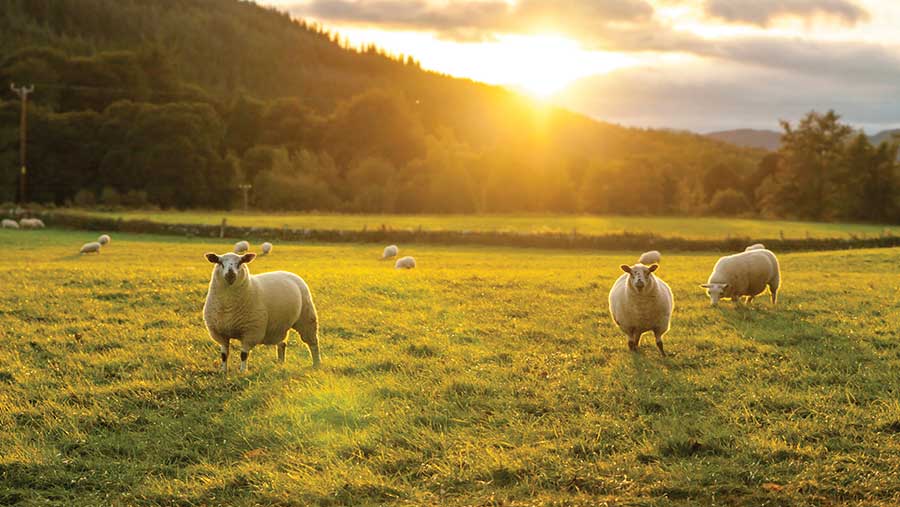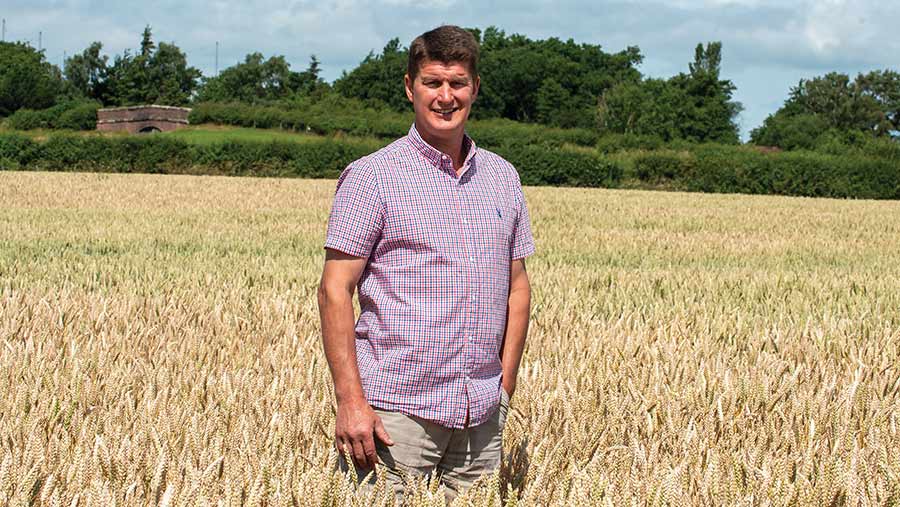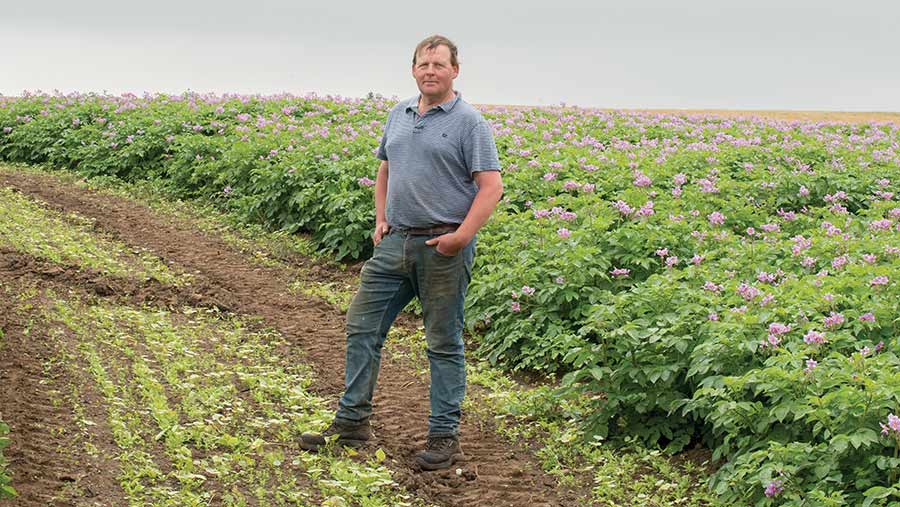Transition survey reveals depth of concern over policy and costs
 © Visualis World/Adobe Stock
© Visualis World/Adobe Stock Input price volatility and uncertainty over government policy continue to hold back farmers looking to secure a sustainable future for their businesses, a major survey has revealed.
The third Farmers Weekly Transition survey – carried out by Macleod Research – provides a snapshot of the UK farming sector as it tackles post-Brexit challenges and opportunities.
The survey polled the opinions of more than 500 UK farmers across the UK in the spring of 2023.
Farms of all types and sizes were represented and their views captured on issues such as agricultural policy, costs, productivity, viability and government support schemes.
See also: How the infrastructure revolution will affect more farmers
Basic payments
The survey showed farmers across the UK continue to rely heavily on support scheme money, with almost 90% receiving some funding.
However, the 10% of producers who went without a payment was double the 5% figure seen in 2022.
Responses from different age groups revealed that the under-45s were far less likely to receive a Basic Payment Scheme (BPS) payment.
Of the younger group, one in six (17%) received no BPS support at all while only 5% of the over-45s were without a payment from the scheme.
On average, BPS revenue accounted for 29.3% of farm incomes in the 12 months up to spring 2023, only slightly down on the 31.7% recorded for the same period a year earlier.
For more than two in five (41%), BPS money made up one-quarter of incomes.
But for 16%, BPS funding still accounted for three-quarters or more of total revenue, a slight increase on the figure for spring 2022 when it stood at 14%.
Future viability
Dwindling support levels continue to cause widespread concern.
A growing number of farmers (49% – up from 45% last year) are now “very concerned” about how they will replace lost revenue from support.
Overall, eight out of 10 farmers registered some level of concern.
Concerns ran so deeply that 87.5% said they were uncertain whether their farms would even survive without BPS support.
More than half (55%) forecast it would be difficult to survive and one-quarter went further, saying survival would only be secured with great difficulty.
Just 10% believed their survival would be achieved easily, down from 12% in the first survey two years ago.
The number of farmers who thought the transition to no BPS would be very easy has halved from 4% in 2021 to just 2% in 2023.
There was also a notable difference in optimism between age groups, with 24% of the under-44s believing it would be fairly easy to survive without the direct payment. Only 9% of older farmers shared that optimism.
Despite the level of concern, 30% of farmers in the UK are yet to start on the transition to life after BPS.
Another 10% have only begun to make changes in the past six months. Both figures are unchanged from the previous survey.
There are key differences across the regions, with 76% of England’s farmers already making moves, up from 71% last year and 65% in the first annual survey.
That contrasts with Scotland where the government has been more vocal in its backing for farmers and pledged to continue providing support payments.
This more positive approach is a possible driver for a much smaller proportion of farmers (40%) who have embarked on transitioning to farming without support.
Costs, productivity and efficiency
Of the farm businesses that have begun making preparations, the largest proportion is eyeing an increase in production to make up for the lost support payments.
Two in five (41%) saw ramping up output as the best way forward, although this proportion has declined slightly on last year’s figure of 47%.
A similar proportion (39%) saw a new diversification as the way forward – close to the last survey’s figure of 38%.
More than one-third (37%) are looking to an off-farm revenue to bolster incomes.
Almost two-thirds already have a source of off-farm income, with 22% in outside employment while 19% own another business and 15% hold investments unrelated to agriculture.
The largest year-on-year changes in preparation are in reducing costs. Inflated equipment prices have seen the number of farmers identifying a change to their machinery strategy as a way forward rise from 25% in 2022 to 30% this spring.
A drop in labour availability since Brexit was also a key factor in making changes.
One in five farmers (21%) are now looking to reduce staff, compared with 16% a year ago.
Contracting out farm work to cut either labour or machinery costs also saw a marked increase as a policy from 11% of farms in 2022 to 17% in 2023.
Despite the volatility seen in input costs and labour availability, the level of reported efficiency remains consistently high.
About 85% of farmers say their farms are run either fairly or very efficiently and that is a figure reported with little variation between England, 85%, Scotland 82% and Wales 84%.
Within the overall figure a rising number believed their farms were running very efficiently at 18% compared with 16% last year and 14% in the first year the survey was carried out.
Environmental measures
When asked what environmental measures farmers where interested in undertaking for financial reward, clean air and pollution prevention came out on top.
For both pollution prevention and clean air, 70% said they would be interested in taking up measures. Interest in biodiversity stood at 55%, clean water supply at 66% and rural beauty and heritage at 47%.
There was a wide difference in measures already being employed. Just 3% of respondents received payment for clean air measures, 6% were already being rewarded for pollution prevention or mitigation and 8% were paid for beauty and heritage work.
While a similar number (9%) were rewarded for clean water strategies, by far the highest level reported was in encouraging biodiversity at 29%.
In England, farmers were asked about the Environmental Land Management (ELM) schemes. Under ELM the new Countryside Stewardship Plus scheme was the most attractive.
Some 56% indicated they would be interested in joining, while 15% would consider measures under the Landscape Recovery scheme. But the Sustainable Farming Incentive had declined in popularity from 67% when it was first mooted in 2021 to 49% by spring 2023.
There was also an increasing number of farmers who were not interested in joining any of the ELM schemes, with 27% saying they would not get involved compared with 18% in 2021 and 23% last year.
Focusing on carbon, fewer than one in five (19%) have measured their footprint.
This varies significantly between regions, with the highest proportion in Scotland at 31% and just 17% in England and Wales.
Across the UK, 41% were considering measuring carbon, but a slightly increased proportion said they have neither assessed, nor intend to measure, their output.
Meanwhile, the number of farmers in carbon-capture schemes remains extremely low at 4%, albeit a doubling of the 2% in the previous survey.
Just 1% belong to a carbon credit trading scheme. The lack of engagement points to a high degree of uncertainty over the carbon credit system and a wait-and-see approach to the still developing market.
Information and government policy
The apprehension in going forward with carbon footprinting is reflected in high levels of concerns about the lack of information on the issue.
About 88% of UK farmers said information needed to improve their approach to carbon management was lacking.
Views on air quality measures were similar with 83% stating they needed more information.
Likewise questions on biodiversity, water quality and heritage issues recorded dissatisfaction at the level of guidance among more than two-thirds of responses. Soil health produced little better results, with 50% calling for more advice.
Of the advice areas, business management guidance was seen to be the best, although there were discrepancies in this category according to age.
Some 51% of farmers aged 45 and over said they received sufficient information on business management.
But less than one-third (31%) of farmers under 44 years old agreed that business management advice was adequate.
Overall, only 12% of UK farmers felt they had enough guidance on farming policy.
Region by region, 97% of farmers in Wales, 93% in Scotland and 87% in England believed they had insufficient information to make changes.
However, the overall proportion of dissatisfied farmers has reduced from 92% in 2022 to 88% in the latest survey.
Dissatisfaction over the lack of advice and the wider farming vision is reflected in dwindling support for the government’s strategy.
Levels of discontent with the farm strategy have risen steadily from 72% in 2021 to 81% last year, and 87% in the spring of 2023.
Just 2% of farmers – down from 7% in the initial survey – were still happy with the government’s long-term farming policy.
In Wales, no farmers (0%) said they were happy with the Cardiff-based government’s vision for farming, while Scotland’s producers were the most satisfied, albeit at just 4% of respondents.
Asked about their own government’s vision, more than two in five (42%) said it showed policymakers had failed to understand farming.
One in 10 said the policy would ruin farming if it continued to be implemented and more than one-quarter (27%) said it should be refocused on home-grown food production.
Sustainability
Lack of support and funding also topped the concerns over sustainability.
More than half (52%) of farmers blamed an uncertain future for their businesses on a lack of funding/profit, poor government support and issues surrounding the planning process.
Others, totalling 30%, saw costs, food prices and supermarket policy as responsible for for the lack of sustainability.
Asked whether their units were sustainable, the number of farmers who said “no” increased from 19% in 2022 to 26% this year.
Across all regions, under half (43%) of farmers felt their units were sustainable – a decline from last year’s 54%.
However, while England (42%) and Wales (41%) were close to the average, almost two-thirds (61%) of Scotland’s farmers believed they farmed sustainably.
Scotland’s situation was also an improving picture, up from 48% in 2022.
Survey comments
Survey analyst Heather Macleod said while respondents were keen to explore new opportunities and willing to change, she was struck by the degree of concern about the future.
The majority of comments revealed significant concern about the political approach to farming and the environment both by the government and opposition parties.
And the proportion of those people expressing fear about the future has gone up.
“Most think farming is not understood by the government and there is insufficient knowledge and expertise among policymakers,” Heather added.
Comments made by respondents showed that many had doubts about the viability of their businesses and future UK food security:
“We need food; wildlife should be looked after alongside food production, not instead of it.” Farmer, West Midlands
“The government and opposition have no understanding of the realities of farming, and care even less.” Grower, East Anglia
“Government personnel [are] too distant from the reality of farming on the ground.” Farmer, Scotland
“Food production and food security is too far down the agenda.” Farmer, Yorkshire
“It will be interesting to see if enough food is still produced in the UK. Hopefully, environmental schemes will inject income and allow farmers to invest in better systems to become more productive and more efficient.” Farmer, Midlands
“[There is] no clear vision or guidance, especially with respect to imports,” Farmer, Wales
“Welsh government demands on land use – for example, tree planting and habitat – are excessive.” Farmer, Wales
“It seems the true hill farmers have been bypassed. How can it cope with no single farm payment when that is the main profit on an extensive hill farm?” Farmer, northern England
“Council red tape. Limited diversification opportunities. High interest rates discouraging investment. The list is endless. Planning costs a fortune and gets knocked back almost always, several times for anything, costing thousands in reapplication.” Farmer, Yorkshire
“Low producer prices, domination of supermarkets and multinationals, low bargaining power of farmers.” Farmer, north-west England
Transition Farmer: Vaughan Hodgson
Cumbria-based Transition Farmer Vaughan Hodgson echoes the views of survey respondents.
He farms a mixed unit of cereals, grassland and 120,000 broilers and says he is cautious about the future.
“We are looking at losing the Basic Payment Scheme, but the rollout of proposed environmental schemes has been patchy and rules are complicated.

Vaughan Hodgson © Angus Findlay
“There are so many different ones and it seems the names of grants change all the time. When schemes are launched, they are too complicated to take in for people who are often flat out running their businesses,” says Vaughan.
“Guidance books run to 150 pages and associated paperwork requires a consultant to explain it. You fear missing out on things that might be crucial for your business,” he adds.
“I would like to see simpler schemes with more concise information backing it up. We also feel that politicians and the people who come up with the schemes don’t understand what it’s like to manage a farm.
“Grain prices have fallen from a £300/t high to sub-£200/t, but the inputs used to grow the crop were bought at peak prices.
“We cannot set our prices, so when politicians suggest the market should determine values, it is delusional to keep saying it will solve the problem. It doesn’t work in food production,” says Vaughan.
“It’s the same across all farming sectors. While 95% of farmers want to improve the environment, the schemes don’t work financially.”
Vaughan recently looked into funding for new technology.
But the prescriptive scheme rules required costly additional equipment to be bought. The extra outlay negated any benefit, so there was no point in continuing the application.
While he is cautious about the current situation, Vaughan says he will continue to look for opportunities.
“We are willing and enthusiastic about farming, but we are exposed to more risk with every decision
we make.”
Transition Farmer: Alan Steven
In Fife, arable grower Alan Steven, voices his frustration with the Scottish government.
Alan had received an update from NFU Scotland president Martin Kennedy that revealed difficulties in getting Green Party coalition members to “see sense and make progress on farming policy”.
“Governments are worried about getting voted back in at the moment, so they are more concerned about their jobs rather than getting on with their work,” Alan suggests.

Alan Steven © Angus Findlay
He says farmers need to know the details of the Scottish government’s 10-year plan.
But that is being held back because policymakers north of the border are lacking information from Westminster on future budgets.
“Food is still needed and we can grow quality produce, but we have to see a way forward to be able to encourage the next generation to follow on and be able to invest.”
Alan identifies the cost of inflation and retail food prices as other major issues.
“Supermarkets are trying to bring prices down while we need them to stay up, as our costs are still high and rising,” he says.
